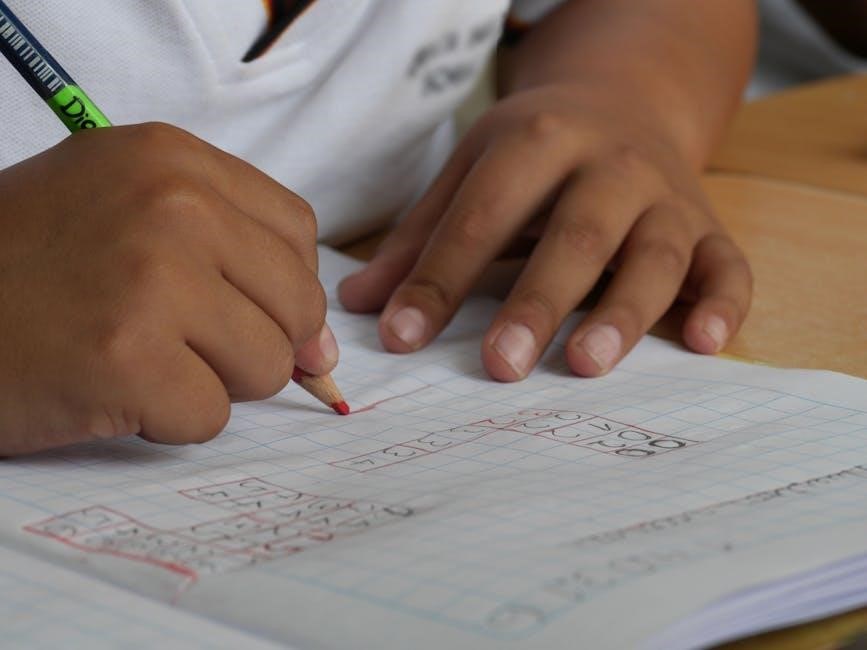Year 7 Maths tests are essential for assessing students’ understanding of key mathematical concepts. These tests cover various topics like arithmetic, algebra, and geometry, providing a comprehensive evaluation of their skills. Regular practice with past papers helps students familiarize themselves with the test format and improve problem-solving abilities. Free PDF resources are widely available online, offering convenient access to practice materials, answer keys, and marking schemes. Consistent revision ensures better preparation for end-of-year exams and builds confidence in tackling mathematical challenges effectively.
Overview of Year 7 Maths Curriculum
The Year 7 Maths curriculum is designed to build foundational skills in key mathematical areas. It focuses on number operations, algebra, geometry, and statistics, ensuring students develop problem-solving abilities. Topics such as basic arithmetic, fractions, and integers are extensively covered to strengthen numerical literacy. Algebraic concepts like simple equations and graphing are introduced to foster logical reasoning. Geometry explores properties of shapes and spatial awareness, while statistics involves data interpretation and analysis. The curriculum emphasizes practical applications of maths, preparing students for real-world challenges. Regular practice with past papers and free PDF resources helps reinforce these concepts, enabling students to approach tests with confidence and clarity.
Importance of Practicing with Past Papers
Practicing with past papers is crucial for Year 7 students to excel in their maths tests. It helps students familiarize themselves with the test format, question types, and time constraints, reducing exam anxiety. By working through past papers, students can identify their strengths and weaknesses, allowing targeted revision. Additionally, past papers provide realistic practice, enabling students to apply their knowledge to diverse problems. The inclusion of answer keys allows for self-assessment, helping students understand their mistakes and improve. Regular practice with past papers also enhances time management skills, ensuring students can complete tests efficiently. This systematic approach builds confidence and ensures readiness for the actual exam, making past papers an invaluable resource for successful preparation.
Benefits of Using Free PDF Resources
Free PDF resources for Year 7 Maths tests offer numerous benefits for students and educators alike. These downloadable materials provide convenient access to practice tests, answer keys, and marking schemes, making revision flexible and efficient. PDFs are easily printable, allowing students to simulate exam conditions at home. The inclusion of detailed solutions enables self-assessment, helping students understand their mistakes and improve. Additionally, free PDF resources reduce educational costs, ensuring accessibility for all. They also cater to different learning styles, offering a structured approach to revision. With a wide range of topics covered, these resources comprehensively prepare students for their exams. Overall, free PDF resources are a valuable tool for effective and affordable exam preparation, fostering academic success without financial burden.

Key Topics Covered in Year 7 Maths Tests
Year 7 Maths tests cover essential topics like number operations, fractions, decimals, ratios, algebra, geometry, and basic statistics. These areas form the foundation for higher-level maths skills.
Number Operations and Basic Arithmetic
Number operations and basic arithmetic form the core of Year 7 Maths tests. Students are assessed on their ability to perform calculations involving integers, fractions, and decimals. Key areas include addition, subtraction, multiplication, and division, with a focus on applying these operations to solve real-world problems. The tests also cover concepts such as percentages, ratios, and basic algebraic expressions. Mastery of these skills is crucial as they lay the foundation for more complex mathematical topics in higher grades. Regular practice with past papers and free PDF resources helps students build confidence and accuracy in these fundamental areas of mathematics.
Algebra and Equations
Algebra and equations are fundamental components of Year 7 Maths tests, focusing on solving linear equations, simplifying expressions, and understanding variables. Students are required to demonstrate their ability to manipulate algebraic terms, identify patterns, and apply formulas to real-world scenarios. Key skills include solving for unknowns, graphing simple equations, and interpreting algebraic expressions. Practice tests and free PDF resources provide numerous examples, such as solving (2x + 3 = 7) or simplifying (3(4x ⎼ 2)). These exercises help students build logical reasoning and problem-solving abilities. Regular practice with past papers ensures familiarity with question formats and improves confidence in tackling algebraic challenges effectively.
Geometry and Shape Properties
Geometry and shape properties are critical areas in Year 7 Maths tests, focusing on understanding basic shapes, their attributes, and spatial relationships. Students explore properties of triangles, quadrilaterals, polygons, and 3D shapes, including angles, sides, and symmetries. Key topics include calculating perimeter and area, identifying congruent and similar shapes, and understanding basic transformations like rotations and reflections. Free PDF resources and past papers provide numerous exercises, such as identifying the properties of a parallelogram or calculating the perimeter of a rectangle. These practice materials help students develop spatial awareness and apply geometric concepts to solve real-world problems, ensuring a solid foundation for advanced geometry in higher grades.
Statistics and Data Analysis
Statistics and data analysis form a vital part of Year 7 Maths tests, focusing on the collection, interpretation, and presentation of data. Students learn to create and analyze graphs, including bar charts, line graphs, and pie charts, to extract meaningful information. Key areas include calculating the mean, median, mode, and range, as well as understanding probability and its application in real-world scenarios. Free PDF resources and past papers provide ample practice questions, such as interpreting survey results or determining the likelihood of events. These exercises help students develop critical thinking and problem-solving skills, enabling them to draw accurate conclusions from data and prepare for more complex statistical concepts in higher grades.

Structure of the Year 7 Maths Test
The Year 7 Maths test is based on the Australian Curriculum, covering various topics and question types. It includes multiple-choice, short-answer, and extended-response questions, designed to assess problem-solving skills and mathematical reasoning. The test format ensures a comprehensive evaluation of students’ understanding and application of key concepts, providing a clear structure for students to demonstrate their knowledge effectively.
Test Format and Question Types
The Year 7 Maths test is structured to include a variety of question types to assess different skills. It typically features multiple-choice questions, short-answer questions, and extended-response tasks. Multiple-choice questions test recall and basic understanding, while short-answer questions require concise, accurate calculations. Extended-response questions allow students to demonstrate deeper problem-solving abilities and mathematical reasoning. Each section is designed to evaluate specific areas of the curriculum, ensuring a comprehensive assessment of students’ knowledge. The test format is clear and standardized, with instructions provided at the beginning to guide students through the examination process.
Calculators are not permitted, and students are expected to show all their working for each question. The test is divided into sections, with questions progressing from foundational to more complex topics. This structure helps students manage their time effectively and ensures they can demonstrate their understanding across the entire curriculum. The inclusion of varied question types ensures that the test is both challenging and fair, providing a holistic view of each student’s mathematical proficiency.
Time Management and Instructions
The Year 7 Maths test is designed to be completed within a specific time frame, typically ranging from 60 to 90 minutes, depending on the institution. Students are advised to allocate their time wisely, ensuring they attempt all questions and leave sufficient time for revision. Clear instructions are provided at the beginning of the test, outlining expectations such as showing all working, using correct notation, and adhering to the prescribed format for answers. Calculators are generally not permitted, emphasizing the importance of mental and manual calculations. Students are encouraged to read each question carefully, plan their responses, and manage their time effectively to avoid rushing through complex problems.
The test instructions also emphasize the importance of legibility and organization in presenting solutions. Students are often reminded to check their answers before submitting, as this can significantly impact their final score. By following the provided guidelines, students can ensure they maximize their performance and demonstrate their mathematical skills effectively.
Marking Scheme and Scoring System
The Year 7 Maths test is scored out of 100 marks, with questions weighted based on difficulty and complexity. The marking scheme is structured to reward accurate answers, correct methodologies, and clear presentation of work. For each question, marks are allocated for both the final answer and the logical steps taken to reach it. Partial marks are awarded for partially correct solutions, encouraging students to attempt all questions. The free PDF resources include a detailed marking scheme, enabling students and teachers to understand the grading criteria. This transparency helps identify areas for improvement and ensures fair assessment. By reviewing the marking scheme, students can better understand how to present their solutions effectively in future tests.

Sample Questions and Answers
The Year 7 Maths test includes multiple-choice, short-answer, and extended-response questions. Free PDF resources provide solutions and explanations for each question, enabling students to practice and assess their understanding effectively. These sample questions cover key topics like arithmetic, algebra, and geometry, with answers designed to guide students through problem-solving strategies and common mistakes. Regular practice with these materials helps improve accuracy and confidence in mathematical skills.
Multiple-Choice Questions with Solutions
The Year 7 Maths test features multiple-choice questions that cover a wide range of topics, including number operations, algebra, and geometry. Each question is designed to assess problem-solving skills and mathematical reasoning. Free PDF resources provide clear solutions, enabling students to review their answers and understand where they went wrong. These questions are ideal for self-assessment, as they simulate real test conditions and help students identify areas needing improvement. The answer keys are detailed, offering step-by-step explanations to ensure students grasp the underlying concepts. Regular practice with these multiple-choice questions enhances time management and confidence, preparing students for the actual exam. They are an invaluable tool for reinforcing learning and achieving success in Year 7 Maths.
Short-Answer Questions and Examples

Short-answer questions in Year 7 Maths tests require students to provide concise, accurate responses, often involving calculations or explanations. These questions cover topics like fractions, algebra, and data analysis, testing understanding and application of concepts. Free PDF resources include examples with worked solutions, guiding students through each step. By practicing these questions, students improve their ability to articulate mathematical reasoning clearly and efficiently. The examples provided in the PDFs help students understand problem-solving strategies and common pitfalls to avoid. Regular practice with short-answer questions enhances their ability to communicate mathematical ideas effectively, a crucial skill for success in Year 7 Maths and beyond.
Extended-Response Questions and Marking Criteria
Extended-response questions in Year 7 Maths tests require detailed, step-by-step solutions, allowing students to demonstrate their problem-solving skills and mathematical reasoning. These questions often involve multi-step calculations, algebraic manipulations, or geometric constructions. The marking criteria focus on accuracy, logical flow, and clear communication of ideas. Free PDF resources provide exemplar answers, highlighting how to structure responses effectively. By reviewing marking schemes, students can understand what examiners expect and improve their ability to present solutions clearly. Regular practice with extended-response questions helps build confidence in tackling complex problems and ensures students can articulate their thinking coherently, a vital skill for academic success.

How to Download the Free PDF
Visit recommended websites, locate the Year 7 Maths test PDF, click the download link, and save the free resource for easy access and printing.
Steps to Access the Year 7 Maths Test PDF
- Visit a reputable educational website or resource platform offering free Year 7 Maths test PDFs.
- Navigate to the section dedicated to Maths resources or past papers.
- Search for “Year 7 Maths test with answers PDF” to find the relevant document.
- Click on the download link provided for the PDF file.
- Save the file to your device for easy access and printing.
- Ensure the PDF includes the test paper, answer key, and marking scheme for comprehensive practice.
- Verify the content aligns with the Year 7 curriculum to ensure relevance.
Following these steps allows students and educators to easily access and utilize the free resource for effective revision and assessment preparation.
Recommended Websites for Free Resources
Several websites offer free Year 7 Maths test PDFs with answers, providing valuable resources for students and educators. White Rose Maths is a trusted platform offering downloadable test papers and answer keys. BBC Bitesize and MyMaths also provide comprehensive revision materials tailored for Year 7 students. Additionally, websites like Past Papers Co and KS3 Maths Tests offer a wide range of practice tests aligned with the curriculum. These resources are designed to support students in revising effectively and understanding exam formats. They are readily accessible and can be downloaded in PDF format for easy printing and sharing.
Tips for Printing and Sharing the PDF
When printing the Year 7 Maths test PDF, ensure it is downloaded in its entirety to maintain formatting. Use double-sided printing to save paper and select A4 size for readability. Adjust margins and orientation to fit all content properly. For sharing, convert the PDF to a writable format if needed or use cloud platforms like Google Drive or Dropbox. Email the file directly to students or print multiple copies for classroom distribution. Ensure the answer key is included or printed separately for easy reference. Printing in draft mode can reduce ink usage. Highlight key sections for focused revision. Sharing digitally minimizes paper waste and allows easy access for remote learners. These tips ensure efficient use and distribution of the resource.

Using the Test for Revision and Practice
Utilize the Year 7 Maths test PDF for targeted revision, focusing on weak areas identified through practice. Regularly review past papers to reinforce understanding and exam readiness.
Creating a Study Schedule with Past Papers
A well-structured study schedule is key to effective revision. Break down the Year 7 Maths curriculum into manageable topics and allocate specific days for each area, such as algebra, geometry, or statistics. Dedicate set times for practicing past papers, focusing on one test at a time. Incorporate short breaks to maintain focus and avoid burnout. Regularly review answers to identify and improve weak areas. Use the provided marking schemes to assess progress and adjust the schedule as needed. Consistency is crucial; aim to practice at least 2-3 past papers weekly. Track improvements over time to build confidence and readiness for the actual exam. A structured approach ensures comprehensive preparation and reduces exam anxiety.
Identifying Weak Areas for Improvement
Identifying weak areas is crucial for targeted improvement in Year 7 Maths. Regularly practicing past papers helps pinpoint topics where students struggle. Reviewing answers and marking schemes reveals common mistakes and gaps in understanding. Focus on reoccurring errors, such as algebraic manipulation or geometry concepts, and categorize them for focused practice. Allocate additional study time to these areas, using free PDF resources for extra questions. Tracking progress over time highlights improvements and remaining challenges. By addressing weaknesses systematically, students can build a stronger foundation and approach tests with confidence. This method ensures efficient use of study time and leads to better overall performance in exams. Regular self-assessment is key to maximizing progress and achieving success in Year 7 Maths.
Using the Answer Key for Self-Assessment
Using the answer key for self-assessment is an effective way to evaluate progress after completing a Year 7 Maths test. By comparing answers with the provided solutions, students can identify correct and incorrect responses, understanding where they went wrong. The answer key often includes detailed explanations, helping learners grasp the correct methods for solving problems. Regular self-assessment fosters independent learning and highlights areas needing improvement. It also builds confidence as students track their progress over time. Additionally, the answer key allows for focused revision, ensuring mistakes are not repeated in future tests. Free PDF resources with answer keys are readily available online, making self-assessment straightforward and accessible for all students preparing for their exams.

Additional Resources for Year 7 Maths
Supplement your study with online platforms offering interactive exercises, recommended textbooks for in-depth practice, and video tutorials for visual learners. These resources enhance understanding and retention, aiding comprehensive preparation for Year 7 Maths tests.
Online Platforms for Extra Practice
Several online platforms provide additional practice opportunities for Year 7 Maths students. Websites like Khan Academy, IXL, and Mathsworld offer interactive exercises, quizzes, and video tutorials covering key topics such as algebra, geometry, and arithmetic. These platforms allow students to practice specific skills, track progress, and identify areas needing improvement. Many platforms are free or low-cost, making them accessible to all learners. They often include step-by-step solutions and real-time feedback, helping students understand their mistakes and improve problem-solving techniques. Regular use of these resources complements traditional study methods, ensuring well-rounded preparation for tests and exams. Utilizing online platforms can also make learning engaging and fun, motivating students to practice consistently and build confidence in their mathematical abilities.
Recommended Textbooks and Workbooks
For Year 7 Maths, several textbooks and workbooks are highly recommended to supplement learning and practice. Titles such as “Year 7 Maths Workbook” and “Maths Made Easy: Year 7” provide comprehensive coverage of the curriculum, including arithmetic, algebra, and geometry. These resources are designed to align with the Australian Curriculum, offering clear explanations and numerous practice questions. Additionally, “White Rose Maths: Year 7” is a popular choice, known for its structured approach and detailed solutions. These workbooks are ideal for both classroom use and home study, helping students reinforce concepts learned in class. Many also include answers to questions, enabling self-assessment and improvement. They are widely available in bookstores and online, making them accessible for students seeking additional practice and revision materials.
Video Tutorials and Interactive Tools
Video tutorials and interactive tools are invaluable resources for Year 7 Maths students, offering engaging ways to learn and practice concepts. Platforms like Khan Academy and Mathspace provide video lessons and interactive exercises tailored to the Year 7 curriculum, covering topics such as algebra, geometry, and statistics. Tools like GeoGebra allow students to explore mathematical concepts through interactive simulations, making abstract ideas more concrete. Many websites also offer virtual whiteboards and practice quizzes with immediate feedback, helping students identify areas for improvement. These resources complement traditional study materials like past papers and workbooks, providing a dynamic and immersive learning experience. They are particularly useful for visual learners and those who benefit from hands-on practice to reinforce their understanding of key mathematical principles.
Year 7 Maths tests with answers PDF free download are invaluable for revision and practice. Regular practice builds confidence and improves problem-solving skills, ensuring academic success.
Final Tips for Success in Year 7 Maths
To excel in Year 7 Maths, adopt active learning techniques by applying concepts to real-world problems. Regularly practice past papers to improve time management and accuracy. Understanding key principles is more effective than memorizing formulas. Maintain a positive mindset and reduce exam anxiety by staying organized. Seek help early if struggling with a topic to avoid gaps in knowledge. Use visual aids like graphs and diagrams to enhance understanding. Review mistakes from practice tests to identify and improve weak areas. Encourage consistent effort and celebrate progress, no matter how small. A well-structured study schedule and healthy lifestyle, including adequate sleep, will support learning. By staying focused and persistent, students can achieve their full potential in Year 7 Maths.
Encouragement to Continue Practicing
Consistent practice is key to mastering Year 7 Maths. Encourage students to regularly use free PDF resources, such as past papers and workbooks, to reinforce their understanding of key concepts. Celebrate small achievements to build confidence and motivation. Remind them that every question attempted, whether correct or incorrect, is a step toward improvement. Emphasize the importance of reviewing mistakes to learn from them. Practicing regularly, even for short periods, helps develop problem-solving skills and reduces exam anxiety. Stay positive and remind students that persistence and dedication will lead to long-term success in maths. By fostering a growth mindset, students will embrace challenges and view practice as an opportunity to grow.
Importance of Seeking Help When Needed
Recognizing when to ask for help is crucial for success in Year 7 Maths. Students should never hesitate to seek clarification on difficult topics from teachers, peers, or online resources. Early identification of weak areas through practice tests can guide focused learning. Utilizing free PDF materials, such as answer keys and video tutorials, can provide additional support. Encouraging open communication with educators fosters a supportive learning environment. Remember, seeking help is a proactive step toward understanding and mastering mathematical concepts. It not only strengthens problem-solving skills but also builds confidence for exams. By addressing challenges promptly, students can achieve their full potential and excel in their Year 7 Maths journey.

